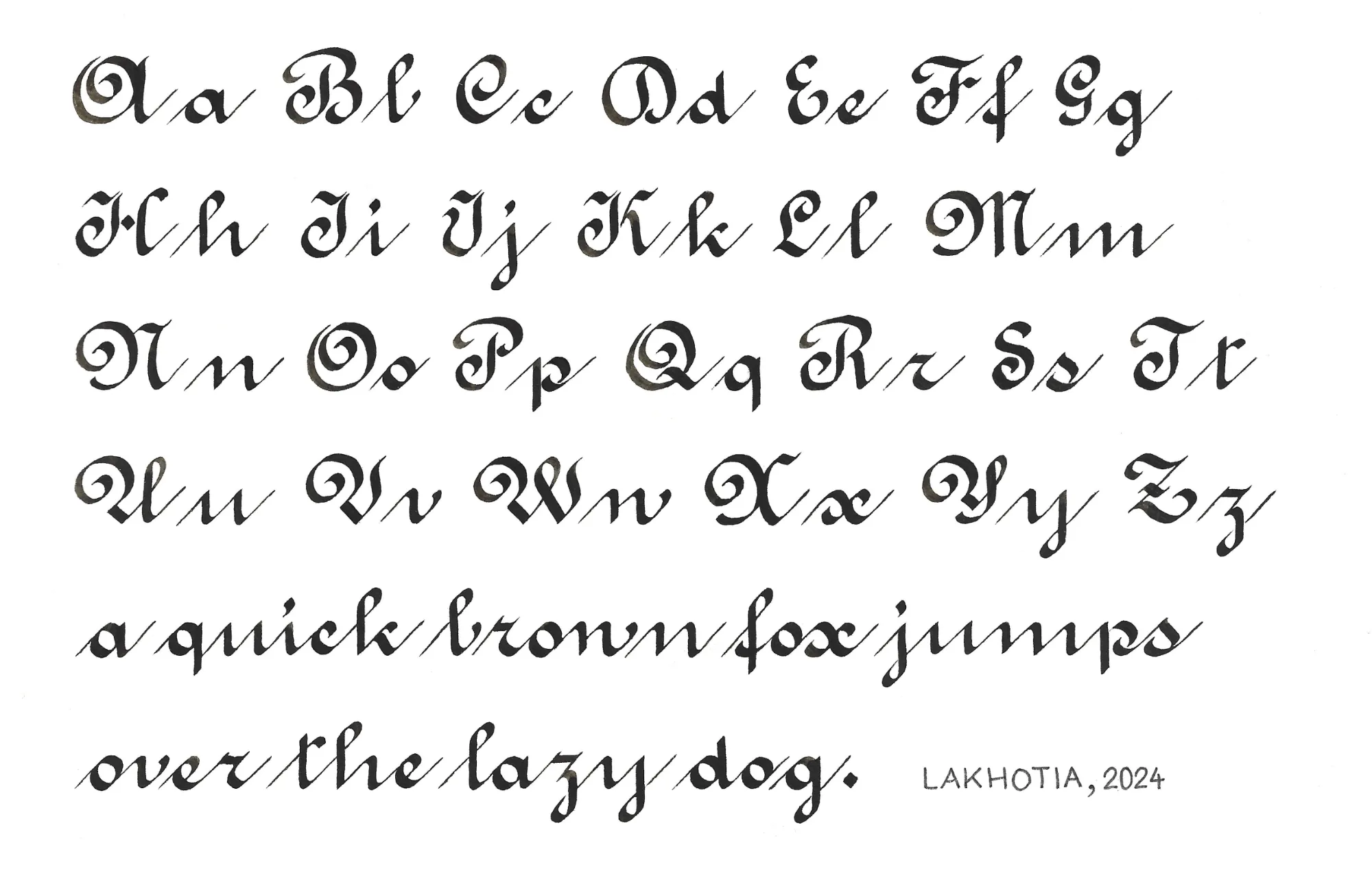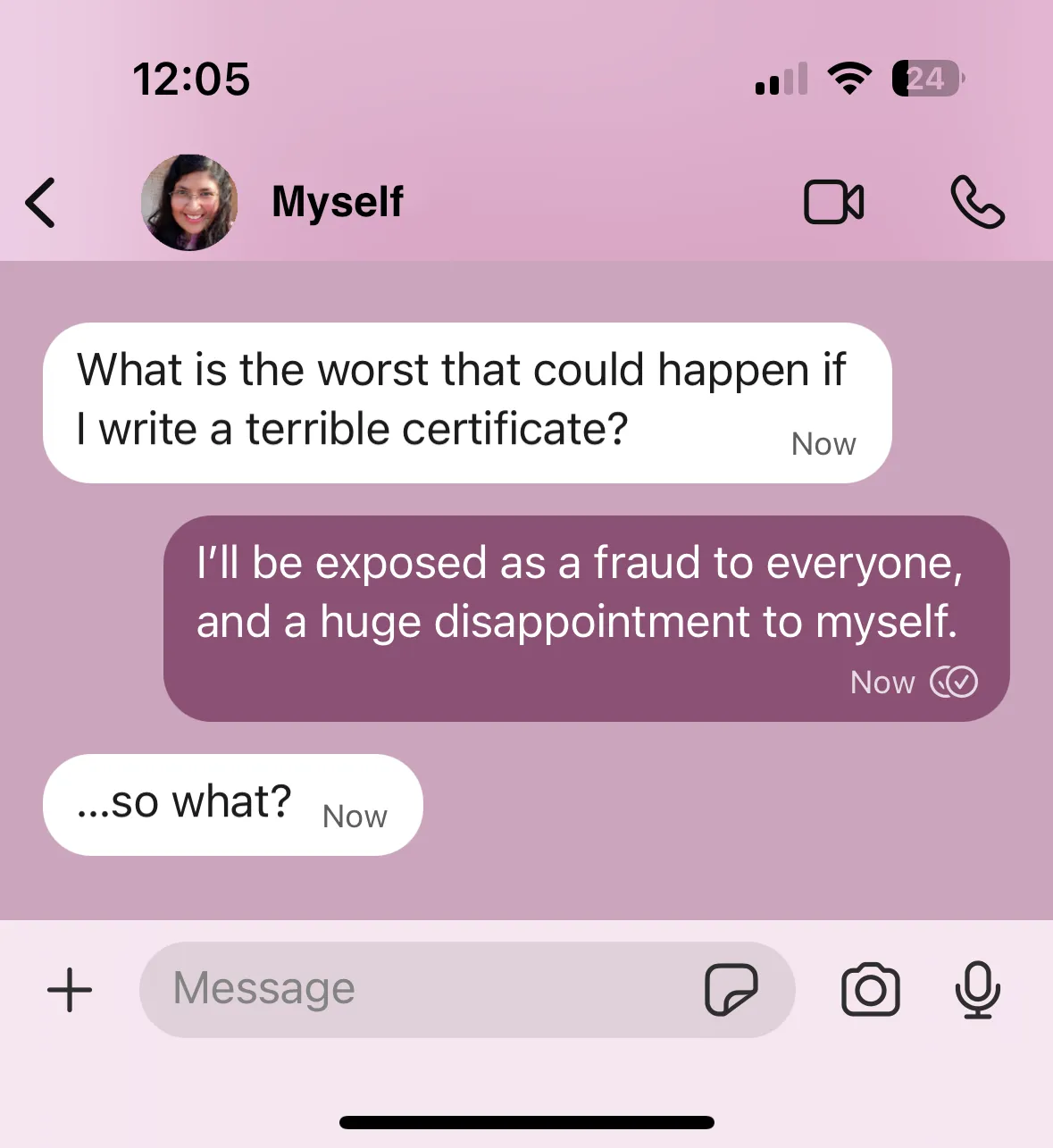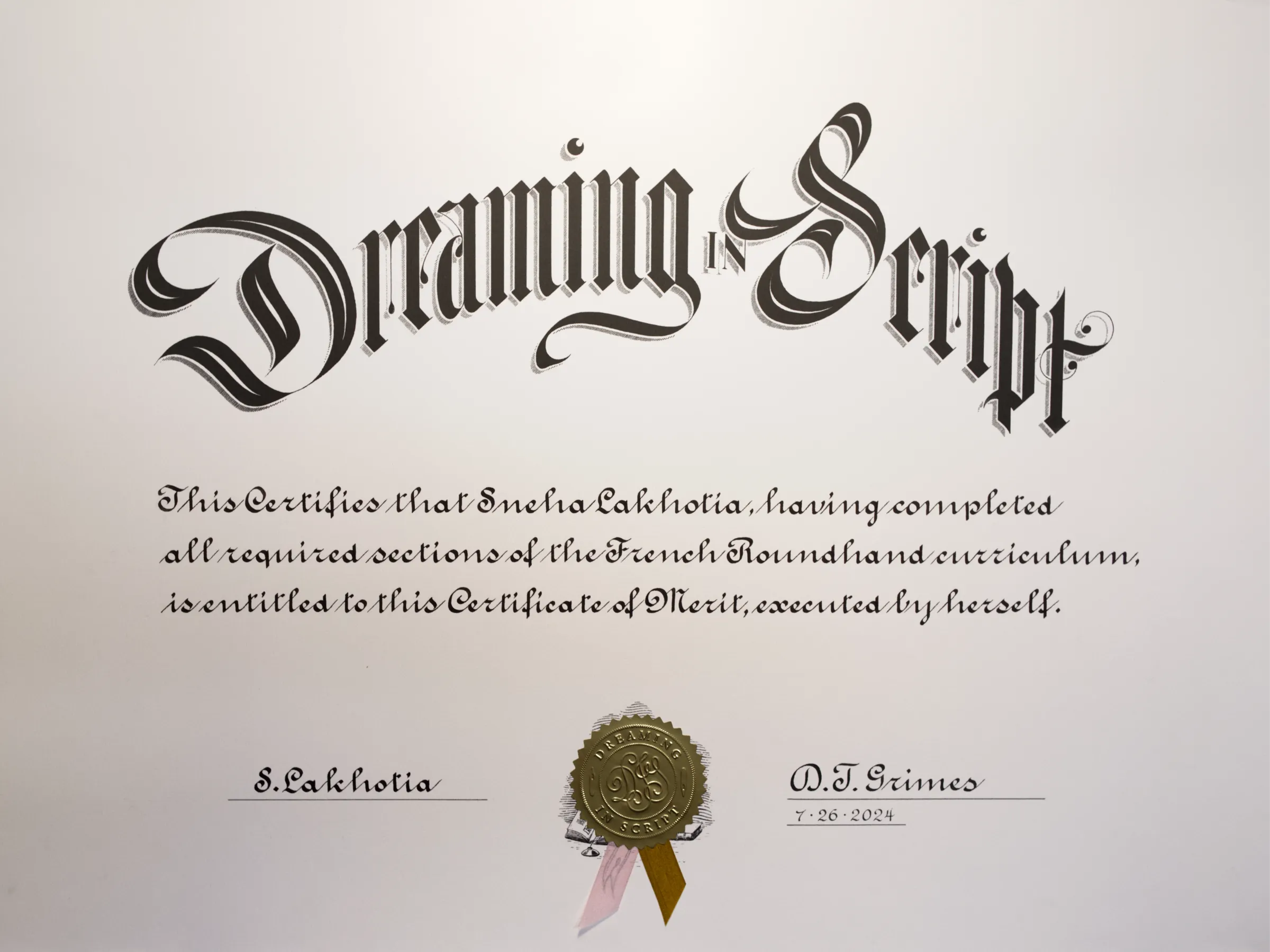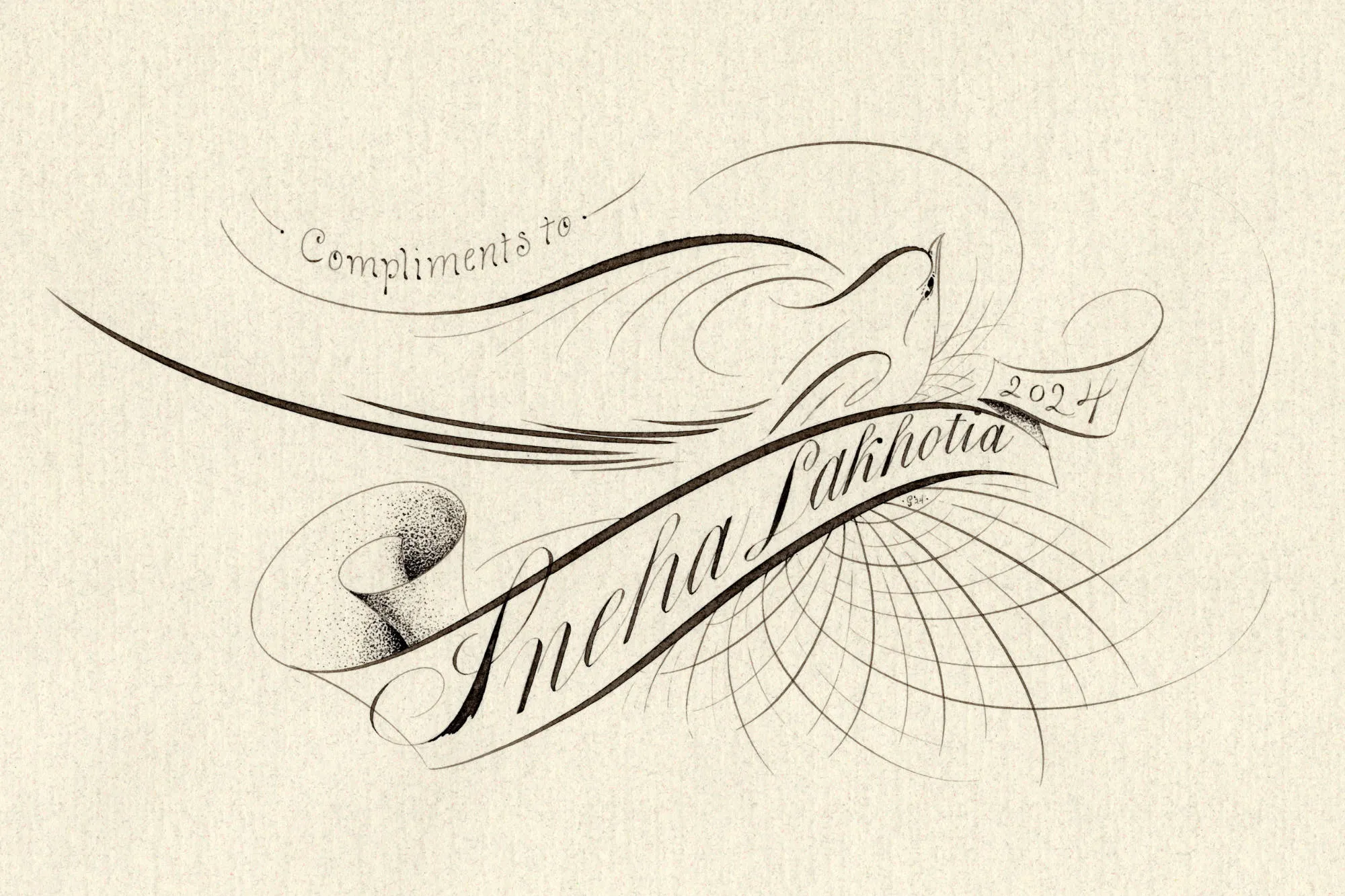Overcoming My Perfectionism
Written on October 10th, 2024 by S. Lakhotia
I’ve had an ongoing relationship with perfectionism since childhood. Until recently, I even took pride in calling myself a “perfectionist,” as I believed it was required to achieve my ambitions. I now realize how much it was holding me back — how it robbed me of the joy in what I pursued. I’ve faced three burnouts in my life, all with perfectionism at the root.
This essay is about dealing with my perfectionism during the Dreaming in Script (DIS) Certificate of Merit process, but I have a feeling most of you will be able to relate to my experience in some way or another. More importantly, I hope it helps you rediscover the path to joy as you get inspired to leave perfectionism behind.

The Dreaming in Script Certificate
I personally committed to writing my DIS Certificate of Merit in the middle of 2023. I saw this as an opportunity to put my penmanship skills to use in a way that represented all the hard work and perseverance that went into learning French Roundhand. I was excited to have a tangible commemorative certificate, which I would be proud to display in my art space. I also knew that it would mean a lot to David, and I wanted to do something in return for all the support I had received from him over the years.
In January of 2024, some personal events left me thinking I wouldn’t find the time to pursue it after all. Simultaneously, the undercurrents of my relentless perfectionism had begun weaving through my practice. A small part of me felt a sense of relief knowing that I had quietly resigned to give up my goal before I’d even begun.
After a thoughtful conversation, David encouraged me to reconsider. He knew that I would miss out on the sense of achievement I am now feeling, and he was willing to help me despite my difficulties. With the renewed faith in myself, I decided that I would persevere.
Insights from my exemplar submission
As a part of the certificate application process, I was required to write a formal exemplar that demonstrated my competency in French Roundhand. Although David had taken care to assure us that our specimens need not be the best pieces of writing we ever produced, my inner critic had its own monologue: “He doesn’t actually mean that; he’s just being kind,” or “Maybe he means that for everyone else, but he will definitely be disappointed with my script,” or “Everyone has high expectations from me, and I am going to let them down.”
The pressure of making a “perfect” specimen was getting to me, but I forced myself to persist. I was deeply unhappy with the errors in my submission; they grabbed at my attention and taunted me. Needless to say, nothing about this experience sparked any joy at all.
Over the next few months, I found that I was not able to easily shake off the disappointment I felt about this experience. I started delving into understanding the roots of my perfectionism, and searching for tools to help me overcome it for the remainder of this project.
In my research, I discovered a theory which suggests that the inner voice who speaks up most when we are feeling the pressures of perfectionism is trying (in a very misguided way) to protect us from anticipated shame and ridicule. The idea that the inner critic is protective, rather than debilitating, was revolutionary.
From this point forward, on numerous occasions unrelated to penmanship, I started reminding myself that the anticipated shame was unfounded. I began to hear a new voice that could reassure my inner critic. She would say things like: “Sneha, this was not your best, today. That’s okay, you will be better next time.” It was far from easy to overcome the pressure of perfectionism in each moment that it arrived, but I found it was getting easier to recover quickly from the built-up pressure I had been placing on myself.
The weight of a blank certificate
When my blank certificate finally arrived in the mail, I delayed opening it for a few days—the stress of having it in my hands was too much. This paper represented all of my insecurities, and the weight of holding it in my hands felt crushing. There was no way back now; no (good) excuses left. The pressure was real, and the reassuring voice I’d discovered was not able to convince the inner critic otherwise.
When I finally took my certificate out of the tube, I immediately put it under my mattress. After all, it needed to be flattened from the time it had spent rolled up, right? I intended to take it out after a week, after I had gotten over my jangling nerves. One week turned to two, and two turned to three…
I saw some of my classmates practicing for their own certificates on the course forum. Feeling compelled to practice alongside them, I found myself resentfully picking up my pen and the recommended sumi ink—an ink that had given me grief in the past. After writing a few lines, I was convinced: I would write the worst certificate ever.
I decided to speak to David, sharing my vulnerabilities. I told him it would always be a huge regret for me if I was unable to enjoy writing my certificate. Of course, he encouraged me and said that he would be proud to receive my work no matter what the script looked like. “He didn’t mean it,” chimed my inner critic.
No other voice emerged to challenge her. I was stuck.
The final stretch
Thankfully, as the graduation deadline drew nearer, the reassuring voice in my head started to speak up again. She was more direct this time, tired of nonsense:
Something about this thought clicked. I had a similar realization while pursuing my PhD: the certificate (or degree) would only have as much meaning as I’ve given it. I was the one assigning all of these thoughts (both positive and negative) to the process. I knew in my heart I’d worked hard on my script, I’d been respectful of my learning opportunities, and I could see that my script had objectively improved since I started. I began feeling a little better.
I took out good quality paper to practise and tried a couple of different inks that worked well for me. I thought about how much I wanted to avoid feeling negative about writing my certificate, so I leaned into the joy of writing with an ink that I had chosen rather than the sumi ink that was chosen for me.
As I sat at my desk looking at the certificate fully prepared for inking, the reassuring voice piped up firmly and said, “Sneha, we will enjoy this process, even if the letter forms are not the best.” Fortified, I gave up the need for control. I felt a switch flick off in my head; the inner critic fell silent and sat back in her chair. A flood of joy and a current of excitement ran through me. I took a deep breath, dipped my pen in ink that I had chosen, and started writing. I could feel my smile getting wider and wider as the pen flew easily across the paper.
At this moment, I genuinely did not care about the imperfections of what I was producing. All I could feel was the immense joy of finally writing my Certificate of Merit — the satisfaction of being freed from months of self-doubt and hurtful self-talk.
I’m proud of the certificate I penned. The experience was all that I was striving for. I’d found and held a state of internal bliss while I wrote — one I didn’t even know existed. I was jubilant at finally having achieved such a feat.
I decided that I would not make any major corrections to my work. I only marked up a few letters that needed minor improvements. I kept my certificate fresh-from-the-pen, as doing otherwise would undermine my joy in the process of writing. Not even once did my eyes go to the flaws on that paper. Instead, for the first time, my eyes began to seek all the letterforms I was proud to have executed well. I felt my happiness expanding!
It has been an arduous journey to reach a point in my life where the inner critic feels safe enough to sit back and enjoy the prevailing reassuring voice in its place! I feel so grateful to finally be able to acknowledge the imperfections, and move on further down the road to finding joy. I hope it inspires you to know that this is possible, and it is something worth seeking. To find joy in the process: nothing beats that!
I hope that someday you get to feel this for yourself!
Editor’s Note:
A big “Thank You” to Sneha for this wonderful peek into the confusing, frustrating, and vulnerable state that many of us find ourselves in when we tackle calligraphy projects. Sneha’s work with DIS has been critical to the continued development and success of students in every class she has mentored. It is with great honor that I call Sneha my classmate, colleague, and friend.
Learn more about Sneha on her Instagram.



